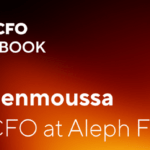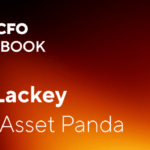5 Tips for leading finance with a partnership mindset
When a company is growing quickly, the finance team needs to rise to the challenge and scale alongside it without sacrificing relationships.
Jeannie De Guzman has seen 1Password – a $2B password management company – grow from 180 employees to over 520 during her tenure as CFO. She makes sure finance functions as a valued business partner to the rest of the organization:
‘I think a successful finance professional is one that can partner with the business and can take a complex situation and really lay it out in layman’s terms. I think that’s one of the most important skill sets of any person, but in finance especially.’
We recently interviewed Jeannie on The CFO Playbook podcast, where she shared her best advice for leading with a partnership mindset.
1. Take inspiration from the HR industry
In some companies, finance is siloed from every other department. But a modern CFO understands that the finance function can’t stand apart.
Jeannie’s finance philosophy takes a page from the HR industry playbook. She stresses that finance needs to adopt a customer service mindset in relation to the rest of the company:
‘HR has done a really great job, they’ve already set the pathway for being business partners. They have titles in the industry to reflect that. With the finance team, at some point I’d love to just be able to call my people, “finance business partners” and have one per business unit, and just be perceived in that same way.’
By acting in partnership with the rest of the business, finance professionals build trust as the company works towards its common goals.
2. Remote work demands proactive leadership
As more organizations embrace remote work, colleagues miss out on the knowledge-sharing and team-building that springs from passing hallway and watercooler conversations.
At a remote-first company like 1Password, Jeannie says leaders need to combat the lack of casual conversations with a full on ‘communication cascade.’ But it’s not a perfect science:
‘I would say one of the things that I miss about being in an office, that I haven’t personally nailed yet, is those two minute conversations in the hallway: when you pass by and you just hear something…We’re still trying to figure that out and trying to over communicate.’
Finance leaders should be proactive by over communicating and encouraging teams to get together.
3. Automation is key to meaningful work
Some may think of automation as a ‘nice to have’, but its impact goes deeper than simply streamlining workflows.
Jeannie says embracing automation allows finance to eliminate repetitive, menial tasks and free up your people to do higher leverage work:
‘With trends like the great resignation, people want to find meaningful work…Automation is really key for being efficient and closing your books and all of that good stuff that finance people do, but also to make sure that your finance people and the team are doing work that they feel is impactful to the company.’
When people feel like they’re making an impact and adding value to the company, they find more meaning and happiness in their jobs.
4. Welcome opportunities to be more well-rounded
If you work at a small company and get the chance to wear multiple hats, take advantage of it.
Developing soft skills, learning how to communicate with non-finance professionals, expanding your technical skills – not only are each of these areas for growth and opportunities for business partnership, Jeannie says they will help finance professionals advance in their careers:
‘When I think about what helped me get to where I am today, it was when I saw an opportunity to do something outside of my role, I tried to do it. And I really tried to get a well-rounded experience in different facets of finance. Not just in controllership, not just in FP&A, not just in treasury, a little bit of tax here and there…Because then you know enough to be dangerous.’
Becoming more well-rounded not only helps you as a finance professional understand the business as a whole, it sets you up on a path to the C-Suite.
5. Learn to communicate differently with different business units
To partner effectively with the rest of the business, you need to make sure you’re speaking the same language.
Jeannie views finance as a strategic advisor and partner to every other department in the company, and believes it’s financial professionals’ responsibility to relay complex information like budget planning to colleagues in a digestible way:
‘I would say that on the finance side, it’s very analytical. I actually expect a lot of analytics from any team that I lead. So I’m a numbers based person….But on the flip side, I’ve learned a lot from how to write things to a large group of people, how to write communications, how I should communicate a bit differently when I’m talking to different groups of people…and it’s certainly helped soften up the way that I talk to different groups of people.’
You don’t necessarily need to be fluent, but taking the time to understand your colleagues’ communication styles will make you a more versatile leader.
Intentional understanding goes a long way
Treating finance as a business partner means taking the time to understand all aspects of the business, from both a people and an organizational perspective.
By developing relationships across business units, and being intentional about your communication style, you’ll be better able to lead strategically, increase efficiency without sacrificing purpose, and propel your career as a well-rounded finance professional.
Sign up to The CFO Playbook Newsletter
Get extra insights from the podcast every Tuesday, to help you thrive in your business and career.







